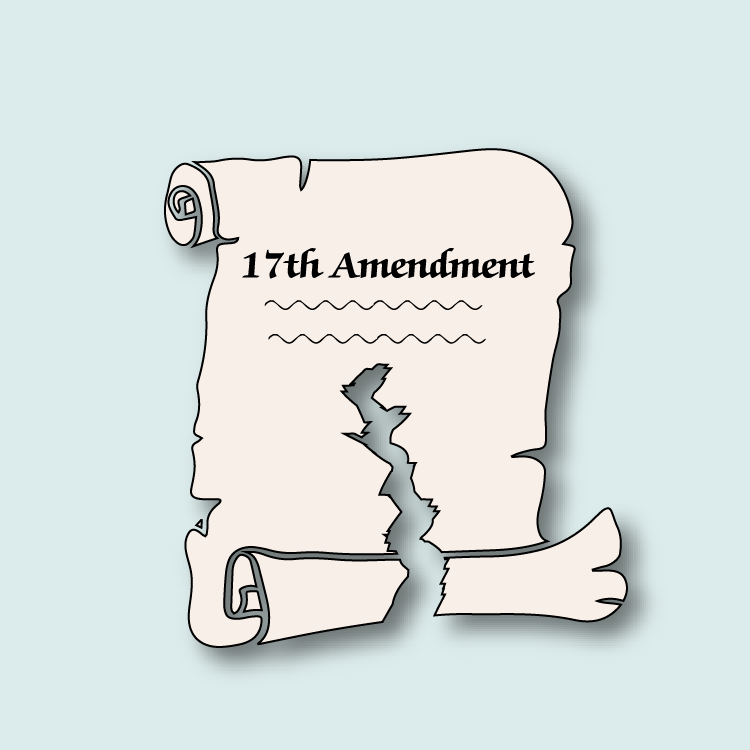Opinion | It’s time to repeal the 17th Amendment
Jan 30, 2020
The Constitution of the United States provides the best system of government ever drafted by man. Despite this, the document is not infallible. The 27 amendments have largely improved the federal government.
The 17th Amendment, however, has been largely damaging to the balance of federalism and strikes against the finely wrought system envisioned by the Founding Fathers. Its detrimental effects provide a basis for its repeal.
This amendment, adopted in 1913, altered the election of senators so they are directly elected by the people of each state. Prior to this change, senators were “chosen by the legislature” of their state in accordance with Article 1, Section 3, Clause 1 of the Constitution.
Anecdotally, most people I’ve encountered aren’t aware of the original system for senate appointment ever existed. Some online now scoff at the idea of devolving that power to the states, arguing it’s an attempt to “infringe on your democracy” and “take away our vote.”
Such an opinion highlights the true harm this amendment has silently laid on this nation in conjunction with an ever-expansive federal government. Americans are forgetting they don’t live in a democracy.
Get The Daily Illini in your inbox!
Democracy, in its pure form, was harshly looked down upon by the Founding Fathers. In Federalist 10, Madison wrote, “Pure democracy … can admit no cure for the mischief of faction … Hence it is, that such democracies … have ever been found incompatible with personal security.”
Madison is referencing the danger of factions, either comprised of the majority or a large portion of the minority, acting in their own self-interest to trample the rights of minority groups. His fear of democracy led him to favor a constitutional republic in which minorities are fairly represented, and protections are granted to their civil liberties.
In Federalist 62, Madison explains the rationale for Senate appointment by the legislature, writing, “It is equally unnecessary to dilate on the appointment of senators by the state legislatures.” He thought the system was fairly uncontroversial, as it had the “double advantage of favoring a select appointment, and of giving to the state governments such an agency in the formation of the federal government, as must secure the authority of the former.”
The emphasis he makes is on the importance of a balanced federalist system between the state and federal government. The Senate was meant not to be a mere reflection of the House but rather a “convenient link between the two” levels of government through which the states could have direct agency in the affairs of the Union.
To properly check and limit the scope of the federal government, the states require a way to meaningfully influence its activities. The Senate no longer provides such means under the 17th Amendment by incentivizing senators to act as populists rather than serve state interests.
The result of the states’ diminished role has been an escalation of controversial issues to the federal level that now dominate the toxic political stage and fuel polarized sentiments.
The federal government was never meant to run roughshod over state legislatures. The whole point of having state governments is to account for divergent views among a geographically and politically diverse people.
A repeal of the 17th Amendment would grant more importance to elections for state legislatures because voting for local representatives would provide a means for an indirect vote for the senators. This increased local civic engagement may result in positive externalities by engaging more voters in local issues.
Admittedly, the bicameral legislature structure has maintained the balance established in the Sherman Compromise by fairly representing populations of states in the House and equally representing states in the Senate. But it could better serve that balance by reverting to the old system.
One may also look at the ineffectiveness of the 17th Amendment in its goals. It was popularized and adopted due to “perceived corruption and inefficiency that marked indirect elections” in the early 1900s. Has the amendment really remedied such corruption?
In a 1994 Gallup poll, 50% of respondents described most members of Congress as corrupt. In 2015, respondents described 52% of members as corrupt. After a century Americans remain untrusting of their politicians and rightfully so.
Americans may not like giving up their direct votes for the Senate. They may not like the fact we do not enjoy a democracy. But these systems of federalism have a purpose and to ignore them is to our disadvantage. It’s time we stop treating the Senate like a varsity squad and return the control to the states.
Matthew is a sophomore in LAS.






